Politics
Kremlin Wages Culture War to Rally Putin’s Voters at Election
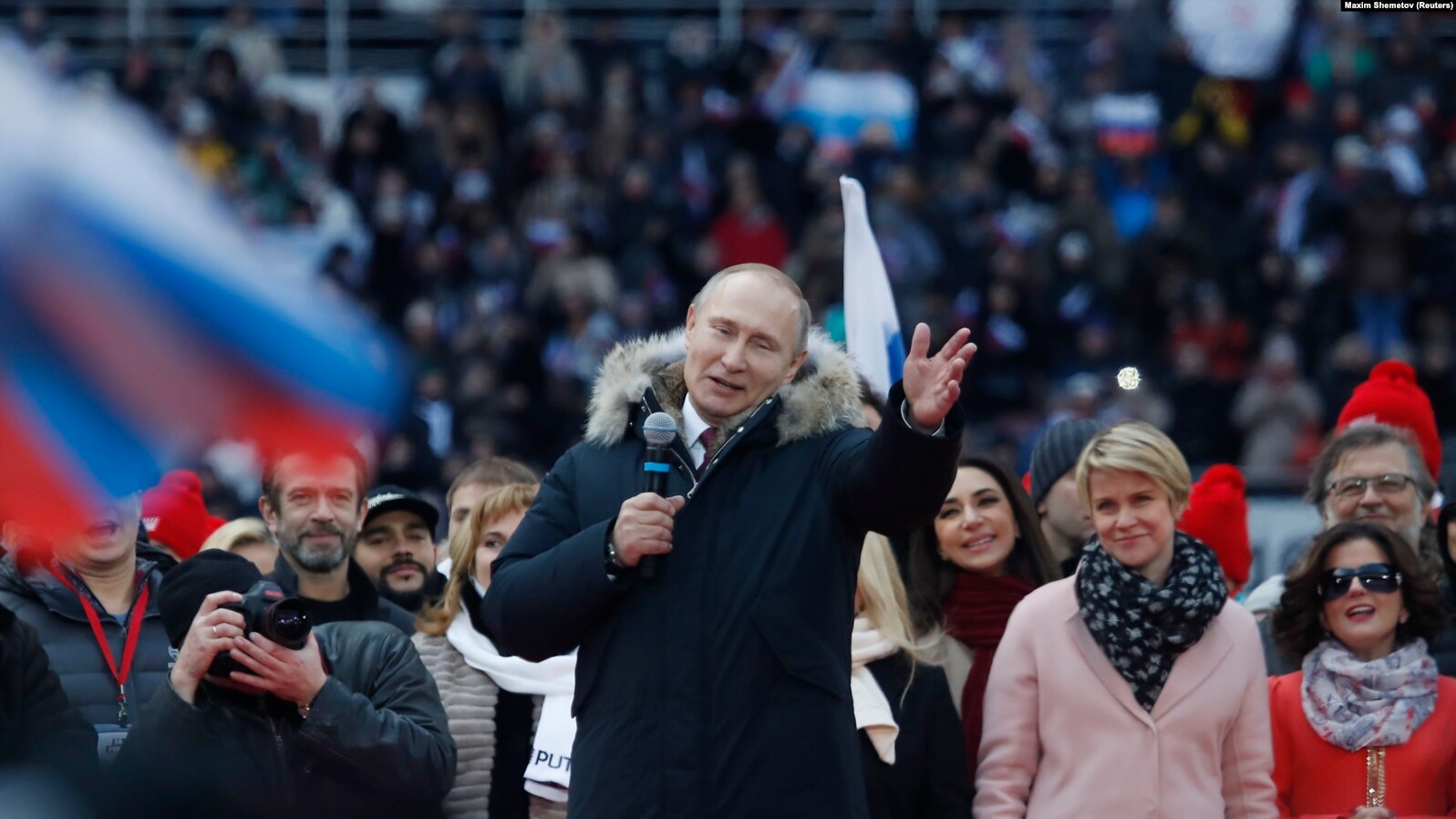
- Campaign focuses on fight with ‘liberal’ West as war goes on
- Putin is likely to seek new six-year term in March 17 election
The Kremlin is rallying support for Vladimir Putin’s election to a fifth presidential term by pitching him as the defender of traditional Russian values against the “liberal” West, as the war in Ukraine grinds on with no resolution in sight.
That’s translating into harsher persecution of LGBT people, growing calls for restrictions on abortion, pressure on women to focus on childbirth instead of careers and efforts to boost patriotic education in schools in an effort to rally Russians behind Putin’s candidacy. He’s widely expected shortly to declare he’s running for another six-year term after Russian lawmakers on Thursday announced the election will be held on March 17, 2024.
The Kremlin plans to present Putin in the election campaign as the guarantor of a Russian civilization that’s under attack by a West bent on destroying the traditional family, religious faith and national pride, said three people with links to the administration.
“Opposition to the West, protection from Western influence, and upholding sovereignty will undoubtedly be the most important thematic part of Putin’s election campaign,” said Alexei Chesnakov, a former senior Kremlin official and political consultant. “Moral justifications of this choice, appeal to historical tradition and justification of some difficulties of the current period by the inevitability of future victories are important elements.”
Putin’s certain to win the tightly-controlled election and officials are determined to deliver an overwhelming majority in a high turnout to portray the vote as public endorsement of his invasion of Ukraine. While he may trumpet Russia’s annexation of four Ukrainian regions it doesn’t fully control as evidence he’s winning the war, Putin’s army remains bogged down against Ukrainian forces backed by billions of dollars in weapons from the US and NATO allies.
An invasion meant to last for days will be entering its third year by the time of the election.
The campaign will highlight new schools and hospitals in provincial cities to show social conditions are improving, though the war will remain on the election agenda as a unifying factor to rally voters behind Putin, according to an official with knowledge of the Kremlin’s preparations.
“We’re defending our traditions, our culture, and our people,” Putin said at the annual Valdai Club meeting in October. The US seeks global “hegemony” and European nations are “destroying their roots that grow from the Christian culture,” he said.
At Russia’s Federal Assembly in February, Putin told lawmakers that Western leaders “plan to finish us once and for all,” and continued: “Look what they are doing to their own people. It is all about the destruction of the family, of cultural and national identity.”

The government revived attacks on gay rights, long a target for the Kremlin, when the Supreme Court approved a Justice Ministry application Nov. 30 to ban the “international LGBT public movement” as extremist. Critics warned the ruling potentially leaves anyone at risk of long jail terms for promoting “non-traditional” relationships.
Calls from the Russian Orthodox Church to restrict abortion access are also energizing Putin’s conservative electoral base. After Patriarch Kirill wrote in November to the State Duma asking it to outlaw abortions in private clinics, Speaker Vyacheslav Volodin, a close Putin ally, urged lawmakers to consider the proposal.
Private clinics in several Russian regions have already ceased to offer abortion services under pressure from officials.
Putin hasn’t publicly supported a ban and the procedure is still offered in state clinics, where most terminations are performed. Still, the debate erupted even as the number of abortions in Russia has declined to about 500,000 per year, far below Sovet-era levels and to a rate similar to many European countries.
The Kremlin “doesn’t want it to overheat so that the topic sounds like a ban on abortion,” political scientist Tatiana Stanovaya said. “The population is against a ban.”
Still, there are signs the family-values rhetoric may be entering unpredictable territory, with some pro-Kremlin politicians challenging women’s ambitions to pursue careers — and even gain a degree — rather than produce children to ease a deepening demographic crisis in Russia.
“We need to stop encouraging young women to obtain higher education” because their career goals mean “the childbearing function is missed,” Margarita Pavlova, a senator in Russia’s Federation Council, said in a November interview with Tsargrad TV, a channel owned by Konstantin Malofeev, a Russian Orthodox nationalist supporter of Putin.
Health Minister Mikhail Murashko voiced similar sentiments in July, telling the State Duma it was a “completely vicious practice” that women considered having children only after higher education and building a career.
Putin weighed in Nov. 28, telling a meeting of the World Russian People’s Council that “many of our grandmothers and great-grandmothers had seven, eight, or even more children. Let us preserve and revive these excellent traditions.”

The focus on values allows officials to deflect scrutiny of Putin’s economic record amid unprecedented international sanctions over the war. Days before the 2018 election, he told lawmakers and officials “Russia must firmly assert itself among the five largest global economies” by the middle of this decade.
It’s now 11th, according to International Monetary Fund data. The ruble has slumped by more than a third against the dollar during Putin’s current term.
To be sure, economic issues have little influence on Putin’s popularity as Russians rally round the flag in wartime, with ruble weakening likely to have the biggest impact, according to Bloomberg Economics Russia economist Alexander Isakov. Polling by the Moscow-based Levada Center showed Putin’s approval rating was 85% in November, up from 69% just before the war started and the highest level since January 2017.
In schools and universities, efforts to shape the new generation in Putin’s image are being stepped up. Classes in basic military training have been revived in schools, while a new history textbook co-authored by presidential aide Vladimir Medinsky justifies the war in Ukraine, laments the Soviet Union’s collapse, and accuses the West of seeking to destabilize Russia.
The textbook is “designed to show the unconditional rightness of Russia in its eternal struggle with the West,” Alexei Makarkin, deputy head of the Center for Political Technologies in Moscow, wrote on Telegram after it was presented in August. It’s ”addressed to pre-conscripts and their girlfriends,” he said.
The Kremlin is likely to present “victory” in that confrontation as a goal stretching beyond 2024 and “as the main content of Putin’s stay in power after the presidential elections,”said Andrei Kolesnikov, a senior fellow at the Carnegie Endowment for International Peace. “Russia’s very existence is turning into an endless rematch with the West,” he said.
Current Affairs
New survey points to coalition-led SA, but voter apathy a major factor
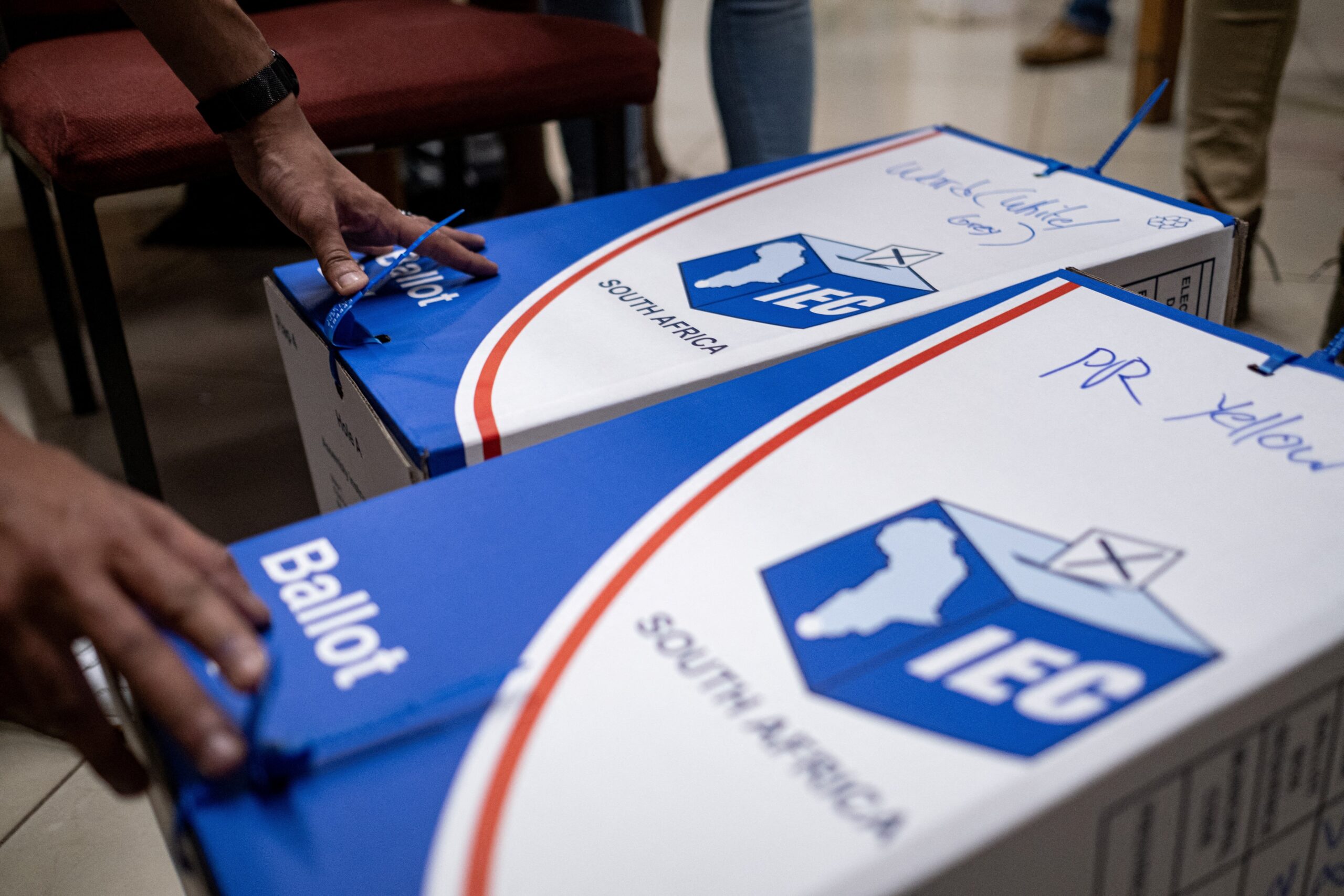
The results of an in-depth survey conducted by African Innovation Research SA (AIRSA) point to the country’s future being in the hands of coalitions and raise concerns about voter apathy, especially among the youth.
The initial sample comprised some 5 000 participants, of whom 46% confirmed they were either not interested in voting despite being registered or had not registered.
The majority of those surveyed by the independent research company based in Cape Town were in the 18–35 age group, a generation who are increasingly disillusioned with how the country is run.
The remaining 2 700 participants, who were interviewed from across a broad section of South Africa’s nine provinces, indicated that support for the ruling ANC is in decline, dipping below the 50% mark to 43% overall.
The ANC’s strongholds remain the Eastern Cape (61% of those surveyed), 58% in the Free State and 65% in Limpopo, where its challenger is the EFF at 23.7%.
In the country’s fourth-largest economy, Mpumalanga, the ANC leads with 52.3%, the EFF at 21.7% and the DA at 19.7%.
In the North West province, it’s a similar pattern, albeit reversed, with the ANC at 48.3%, the DA at 27.7% and the EFF at 20.0%, while in the Northern Cape, the ANC leads with 47.3%, followed by the DA with 24.3% and the EFF with 15.7%.
The country’s economic engine, Gauteng, is a key player in the power dynamics. Here, the ANC garnered 38.7%, but the EFF is growing its base to 19.3%, challenging the DA’s 20% of the province’s voters.
In the Western Cape, as expected, the DA holds onto a leading margin at 46.0%, with the ANC and EFF at 22.3% and 8.7% respectively. Gayton McKenzie’s Patriotic Alliance (PA) also features in the country’s southernmost province, making a notable showing at 5%.
While former president Jacob Zuma may have been barred from becoming a member of Parliament in the Constitutional Court this week, the new uMkhonto weSizwe Party (MKP) will play a pivotal role in KwaZulu-Natal. Results of the AIRSA survey show that while the ANC currently remains ahead with 28.7%, it’s an even race in the province with similar support for the IFP at 26.0% and MKP at 26.7%.
As experience dictates, the smaller parties will begin a series of bargaining tactics as to whose deck they end up in and call the shots.
At collectively accounting for around 20% of the upcoming vote, these potential coalition partners carry significant influence.
AIRSA also noted that voting in this sector is personality-driven as opposed to ideology.
The fragmentation of South Africa’s political landscape could also contribute to increasing dissatisfaction and disillusionment, particularly when linked to the country’s youth and increasing unemployment.
© IOL (Cape Times)
Politics
Zuma lashes out at judges after election ban
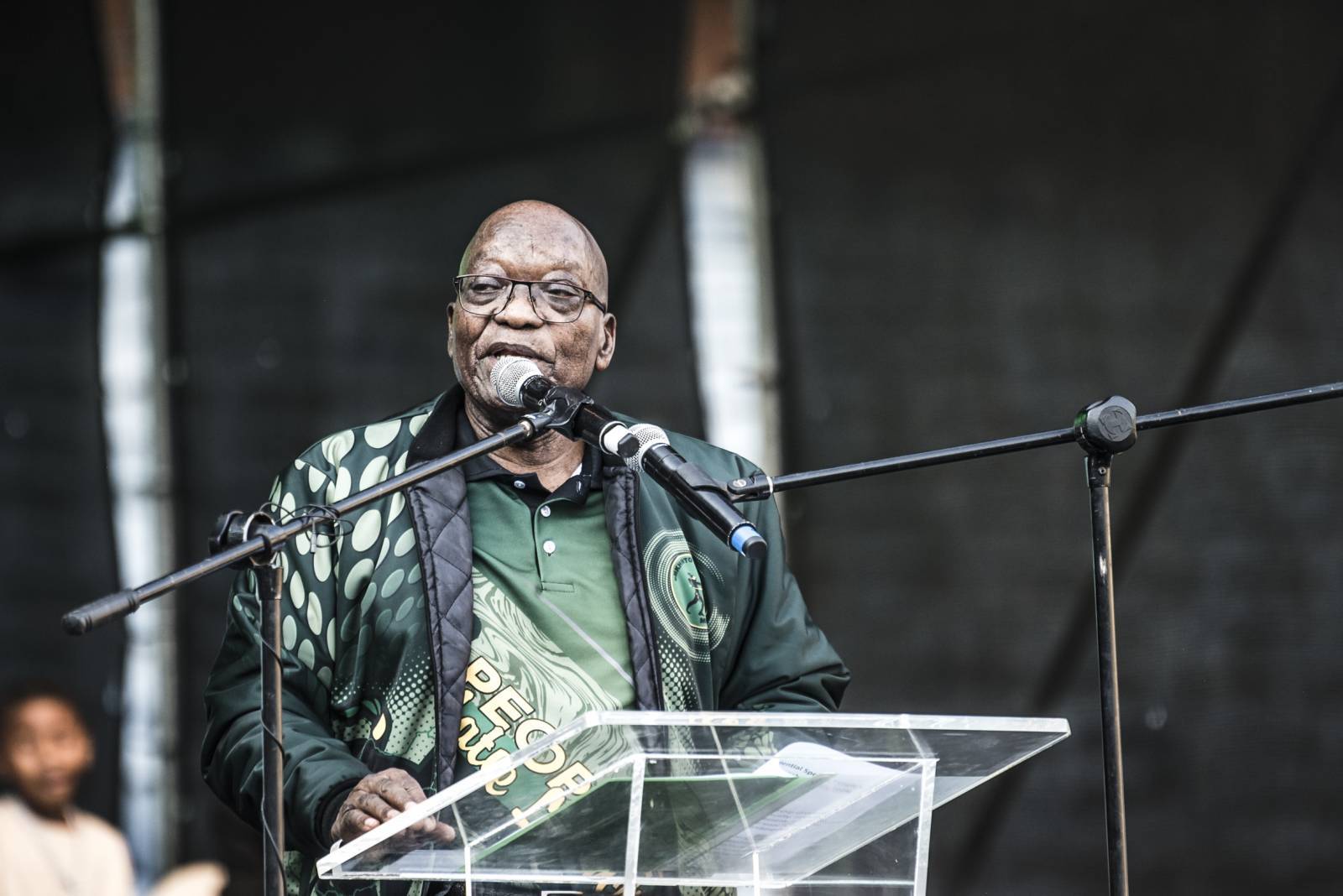
Former President Jacob Zuma has launched a scathing attack on some of the country’s top judges after he was barred from running for parliament on Monday.
In his first interview since the ban, Zuma told the BBC the Constitutional Court was wrong to decide he was unfit to run, based on his 2021 conviction for contempt of court.
“I expected that from our judges, but they are definitely wrong. Not correct,” the 82-year-old said, adding that the constitution should be changed.
Ahead of next week’s general election, Zuma had been campaigning under the banner of the newly formed uMkhonto weSizwe (MK) party.
He joined the party after falling out with the governing African National Congress (ANC), which he used to lead.
The electoral commission argued that the constitution bars anyone who was sentenced to more than 12 months in prison from serving as a lawmaker – a view backed by the Constitutional Court judges.
Zuma was convicted in 2021 for refusing to testify at an inquiry investigating corruption during his presidency.
His lawyers had insisted he was entitled to become an MP as his sentence was reduced to three months after current President Cyril Ramaphosa released him from prison in what was widely seen as an attempt to placate the former president’s angry supporters.
“The judges of the Constitutional Court have acted very funny to me – towards me in particular,” Zuma told the BBC.
“They are not taking into account the will of the people of this country, they use their own will.”
He was president from 2009 to 2018 before being forced out as leader of the ANC amid allegations of widespread corruption in his government.
The corruption, widely known as “State Capture”, saw hundreds of millions of rands of public assets taken into private hands. Zuma has always denied any direct role in corruption, but is due to face trial next year on allegations of bribery.
He told the BBC he had been wrongly stripped of his role as leader of the ANC.
“I don’t know what ‘State Capture’ means. If people say I am corrupt, what did I do? Do you have any facts about it? Am I guilty?
“I was removed before the end of my term, and nothing was produced as evidence that this was an issue.”
Zuma’s MK party had previously voiced its desire to change South Africa’s constitution, which was drawn up 30 years ago at the birth of the country’s democracy following decades of white-minority rule.
Asked about this in the light of his election ban, Zuma reiterated that the historic document needed to be changed.
“This constitution in the continent of Africa is guided by the laws from Europe, not us,” he said.
“There is nothing that has come right in this continent because we are still dominated by those who were the ones [who] slaved us, and after slavery, oppressed us, and after oppression, put their own laws to run us.
“There are details that clash with our lives.”
An Ipsos opinion poll released last month gave MK 8% of the vote, and the ANC 40% as it loses support to MK and other opposition parties.
But some analysts suggest that with the governing party stepping up its campaign in recent weeks, it could still cross the 50% mark. But if the ANC gets less than half of the vote, it would lose its majority for the first time in 30 years.
MK is expected to do especially well in Zuma’s home region of KwaZulu-Natal. Some opinion polls suggest it could emerge as the biggest party in KwaZulu-Natal, ending ANC dominance of the region.
After Zuma was jailed for contempt of court in 2021, angry supporters sparked days of deadly riots. More than 300 people were killed in the clashes.
On Wednesday Zuma said this violence demonstrated the scale of public support for him.
“This must tell you that the masses of this country loves Zuma – that’s why we had that,” he said.
When asked by the BBC if he would use this interview to call for peace and calm ahead of next week’s election, Zuma replied: “I’ve always done so.”
© BBC News
Current Affairs
Iran’s supreme leader leads prayers at Raisi funeral
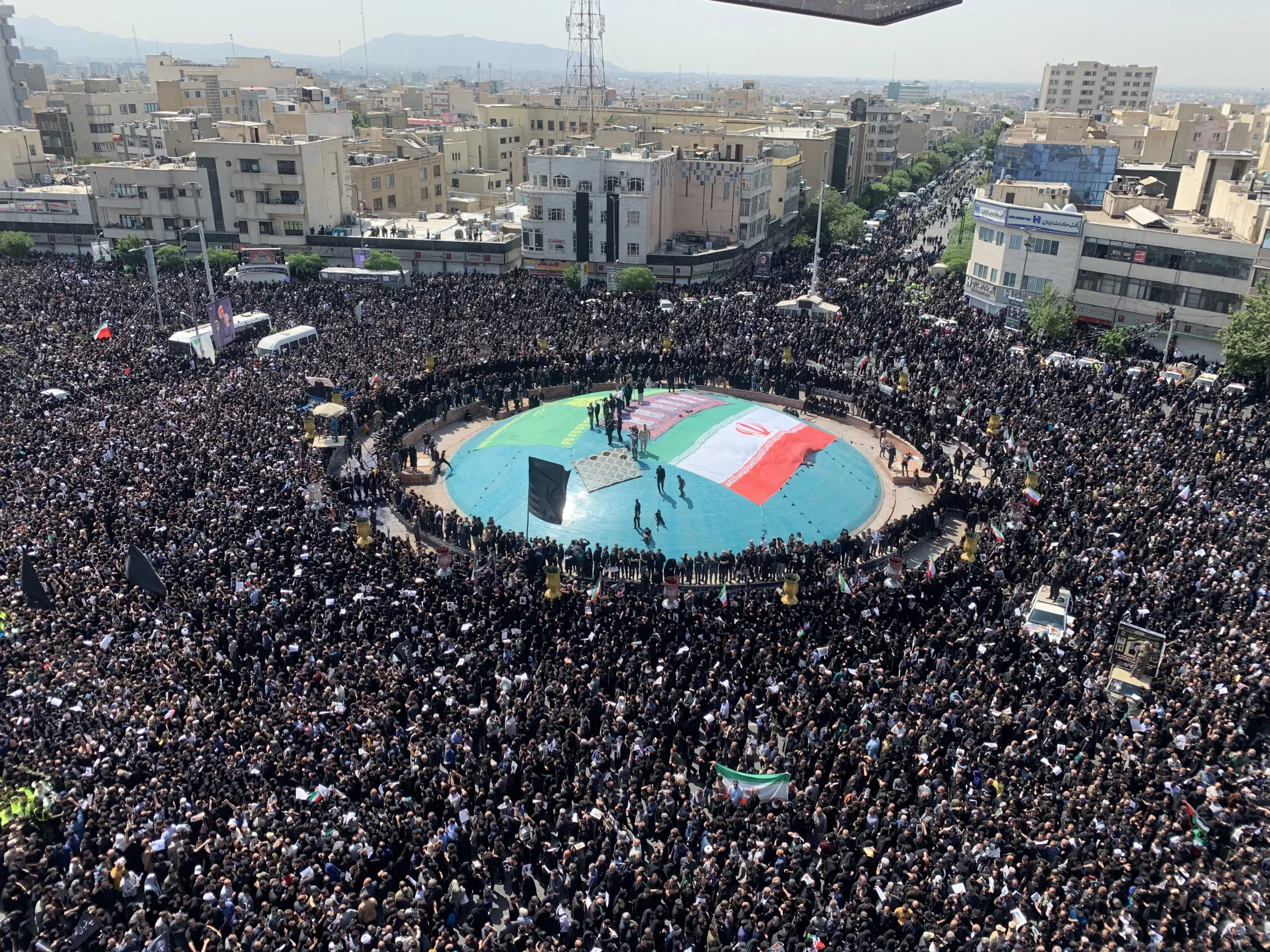
Iran’s supreme leader has presided over a funeral for the country’s late president, foreign minister and others killed in a helicopter crash on Sunday.
Ayatollah Ali Khamenei led prayers at Tehran University, where caskets carrying the dead were draped in Iranian flags.
President Ebrahim Raisi died alongside Foreign Minister Hossein Amir-Abdollahian and six others in a helicopter crash near the border with Azerbaijan.
Authorities had warned against demonstrations against the funeral procession and insults posted online.
“Oh Allah, we didn’t see anything but good from him,” Ayatollah Khamenei said in the standard prayer for the dead in Arabic.
Iran’s acting president, Mohammad Mokhber, stood nearby and openly wept during the service.
People then carried the coffins out on their shoulders, with chants of “Death to America” heard outside.
They loaded them onto a trailer for a procession through downtown Tehran to Azadi Square, where Raisi gave speeches in the past.
In attendance were top leaders of Iran’s paramilitary Revolutionary Guard, one of the country’s major power centres.
Also on hand was Ismail Haniyeh of Hamas, the militant group that Iran has armed and supported during the ongoing Israel-Hamas war.
Haniyeh is widely considered Hamas’s overall leader and has been a prominent member of the movement since 1980. The US Department of State designated him a terrorist in 2018.
“I come in the name of the Palestinian people, in the name of the resistance factions of Gaza…to express our condolences,” Haniyeh said.
He also described meeting Raisi in Tehran during Ramadan, the holy Muslim fasting month.
He said he heard the president say that “the Palestinian issue” remains the key one of the Muslim world, which “must fulfil their obligations to the Palestinians to liberate their land”.
He also claimed that Raisi called Hamas’ October 7 attack in Israel, which saw 1,200 people killed and 250 others taken hostage, an “earthquake in the heart of the Zionist entity”.
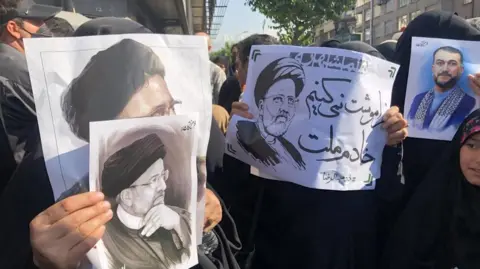
Also expected to attend services in Tehran were Pakistan’s Prime Minister Shehbaz Sharif and a delegation from the Taliban of Afghanistan, which included their Foreign Minister Amir Khan Mutaqqi.
Iran’s theocracy declared five days of mourning over Sunday’s crash, encouraging people to attend the public mourning sessions.
Typically, government employees and schoolchildren attend such events en masse, while others take part out of patriotism, curiosity or to witness historic events.
For Iran’s Shiite theocracy, mass demonstrations have been crucial to demonstrating the legitimacy of their leadership since millions thronged the streets of Tehran to welcome Grand Ayatollah Ruhollah Khomeini in 1979 during the Islamic Revolution, and also attended his funeral 10 years later.
An estimated one million turned out in 2020 for processions for the late Revolutionary Guard General Qasem Soleimani, who was killed in a US drone strike in Baghdad.
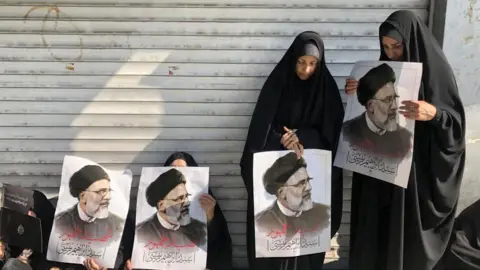
Across the capital, large banners were raised hailing Raisi as “the martyr of service”, while others bade “farewell to the servant of the disadvantaged”.
Some residents in Tehran received texts urging them to attend Wednesday’s ceremonies, the AFP news agency reported.
Footage carried by state TV showed streets filled with mourners, many of whom were carrying pictures of Raisi or the Iranian flag.
Funeral rites for the men began on Tuesday in the city of Tabriz and the Shiite clerical centre of Qom, where thousands of mourners attended ceremonies.
After Wednesday’s procession in the capital, Raisi’s remains will be moved to South Khorasan province, before being transferred to his home city of Mashhad in the northeast.
He will then be buried on Thursday evening in the city after funeral rites at the Imam Reza shrine.
Raisi, a hardline cleric, was a highly divisive figure in Iran. In the 1980s, he oversaw the execution of scores of opposition activists while working as a prosecutor.
He unleashed a brutal crackdown against demonstrators angered by the killing of 22-year-old Mahsa Amini in 2022. She died three days after she was detained by morality police in the capital for allegedly violating Iran’s strict rules requiring women to cover their hair with a hijab, or headscarf.
But his ultra-conservative outlook won favour with supporters of the regime, and Raisi was viewed as a possible successor to Ayatollah Khamenei.
© BBC News
Politics
Ireland to recognise Palestinian state
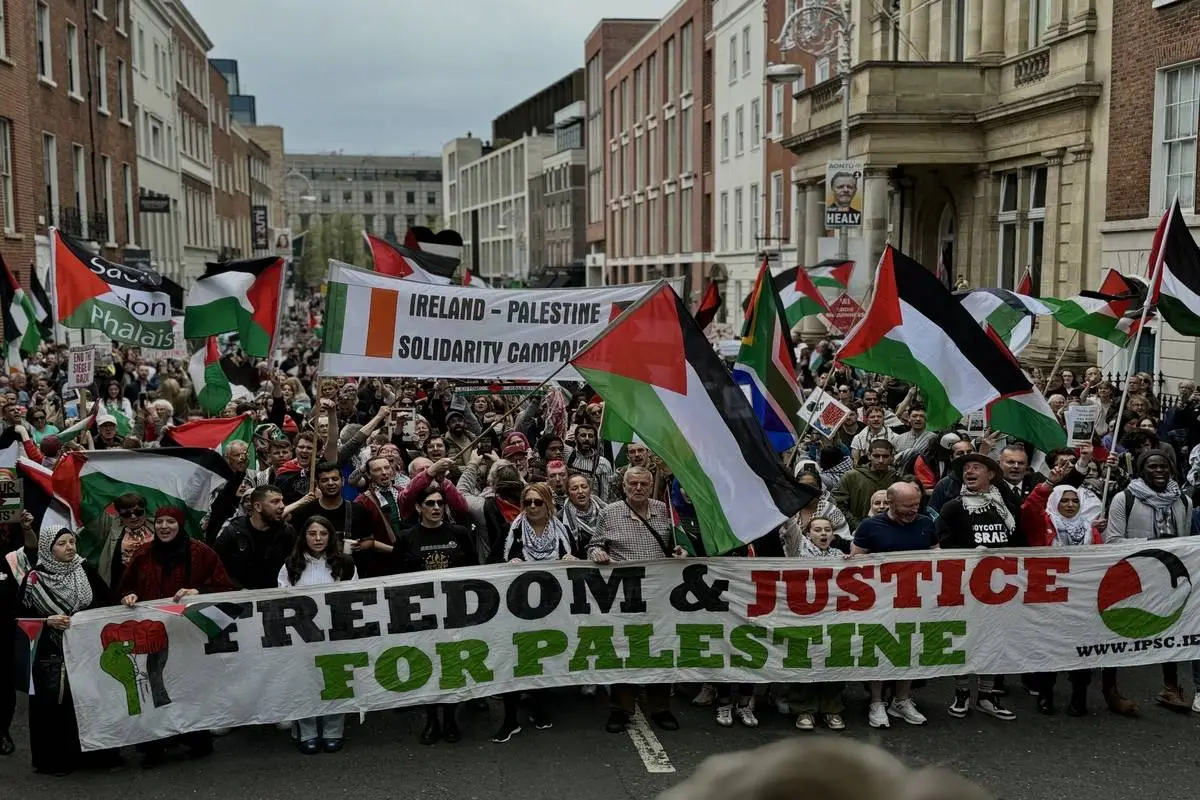
Ireland will recognise a Palestinian state, Prime Minister Simon Harris said on Wednesday, adding that he expected other countries to follow in the coming weeks after talking to world leaders.
“Today, Ireland, Norway, and Spain are announcing that we recognise the state of Palestine,” Harris said at a press conference.
“In the lead up to today’s announcement, I’ve spoken with a number of other leaders and counterparts and I’m confident that further countries will join us in taking this important step in the coming weeks,” he added.
He said a two-state solution was the only credible path to peace and security for Israel, Palestine and their peoples.
The recognition of statehood has particular resonance in Ireland given its history, Harris said.
“Taking our place on the world stage and being recognised by others as having the right to be there was a matter of the highest importance for the founders of our state,” he said.
He added that Ireland was unequivocal in fully recognising Israel and its right to exist “securely and in peace with its neighbours”, and he called for all hostages in Gaza to be immediately returned.
Ireland’s recognition of Palestine will be formally enacted on May 28, foreign minister Micheal Martin said on X.
© Reuters











You must be logged in to post a comment Login